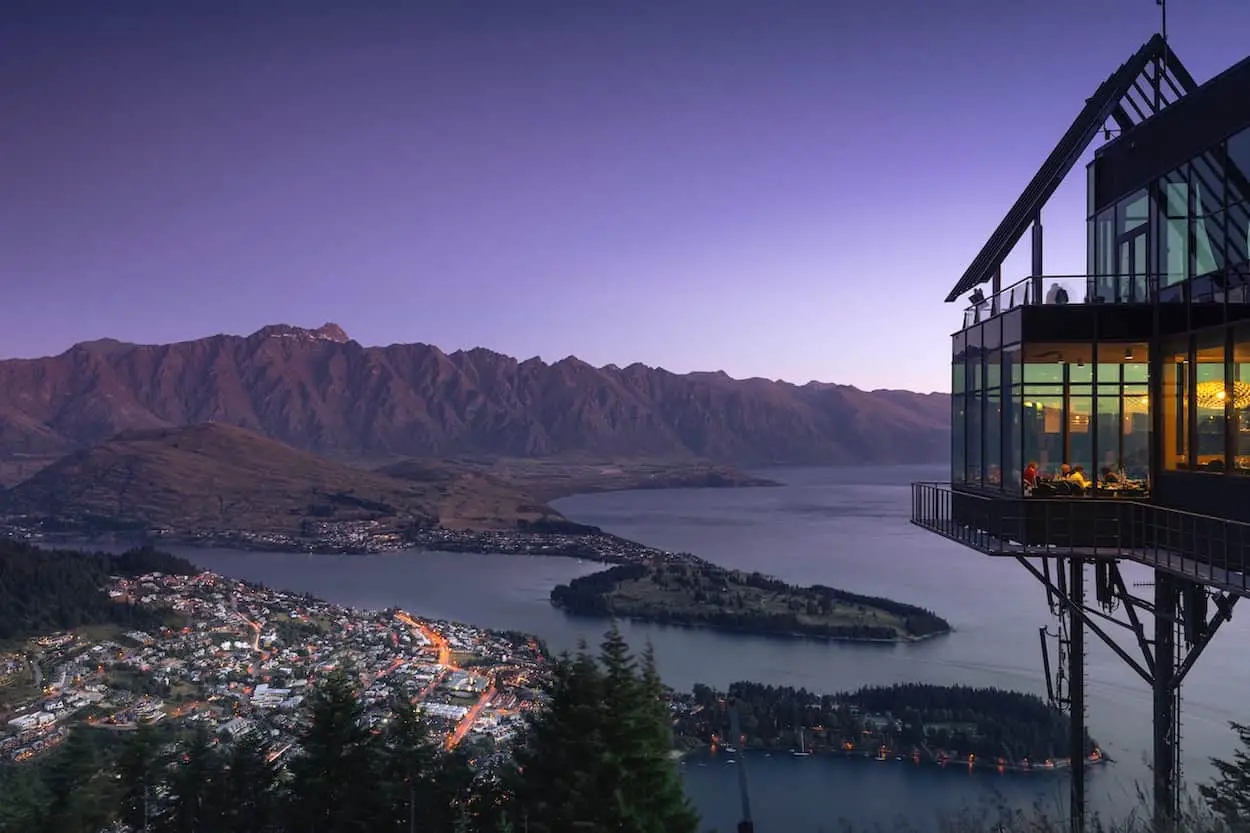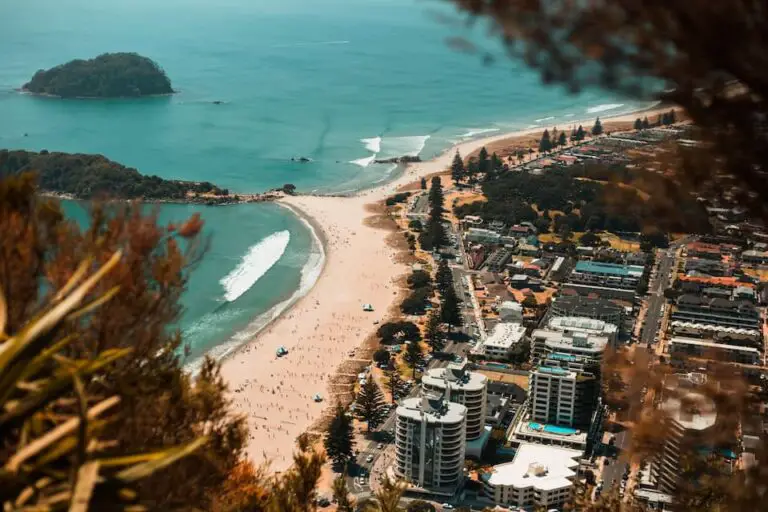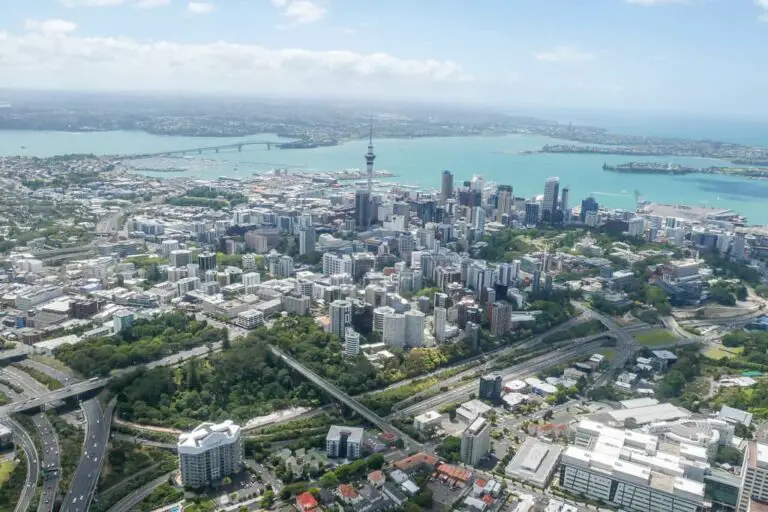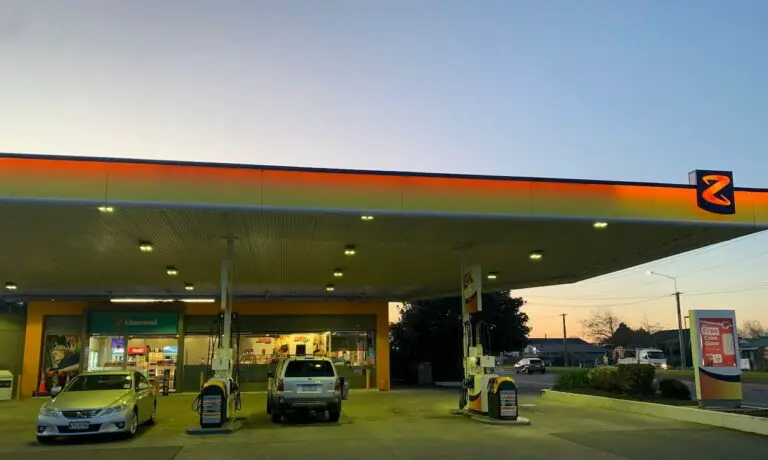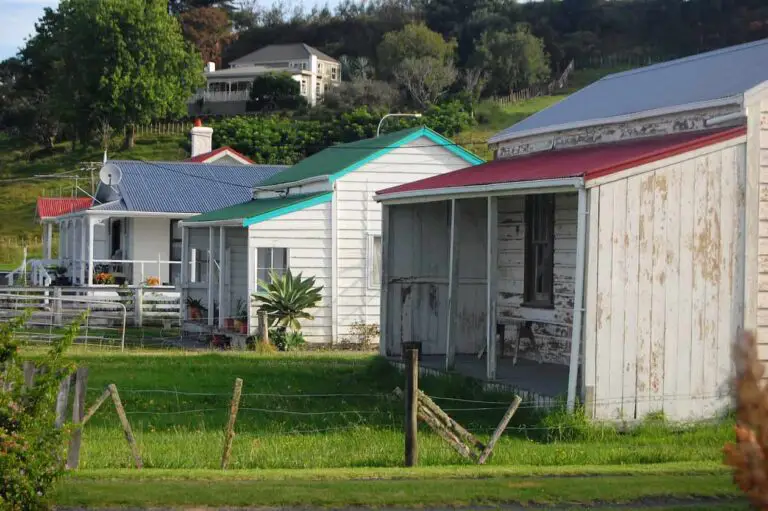Pros and Cons of Living in Queenstown: Should You Make A Move?
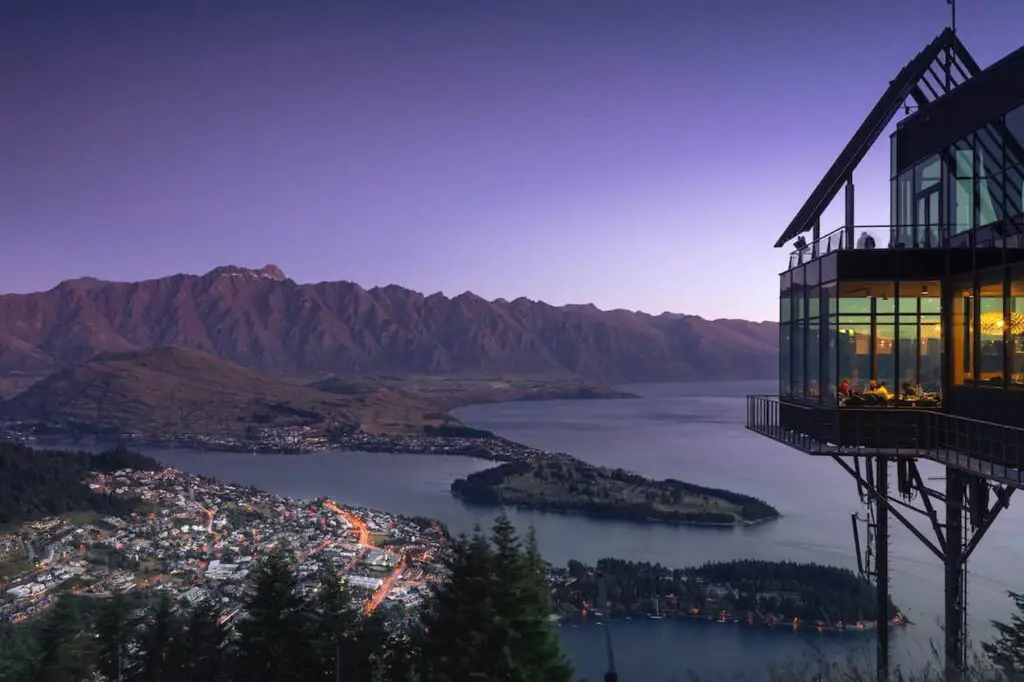
Living in Queenstown is a dream of many. Not only Kiwis are moving at a rapid speed to this small town between the Southern Alps, but also people from all corners of the world. So what is so attractive about Queenstown, and what are the disadvantages of living in this city?
Queenstown is both a party and a family-friendly town, which offers a lot of opportunities for the outdoors, including hiking, skiing, fishing, hunting, tramping, and swimming. Hence, Queenstown is very crowded with tourists in summer and winter.
Queenstown and Queenstown Lakes District are some of the most desirable places to live in New Zealand, yet, it has only about 49,500 residents altogether. Hence, it’s a small place, which comes with its pros and cons. To dive into more details, read this post to the end.
Also, check out this article about Lake Hawea, a town near Queenstown and Wanaka. It might be better suited for families.
About Queenstown
On the map below, you can see the Queenstown Lakes District, which includes Queenstown and Wanaka – its main cities.
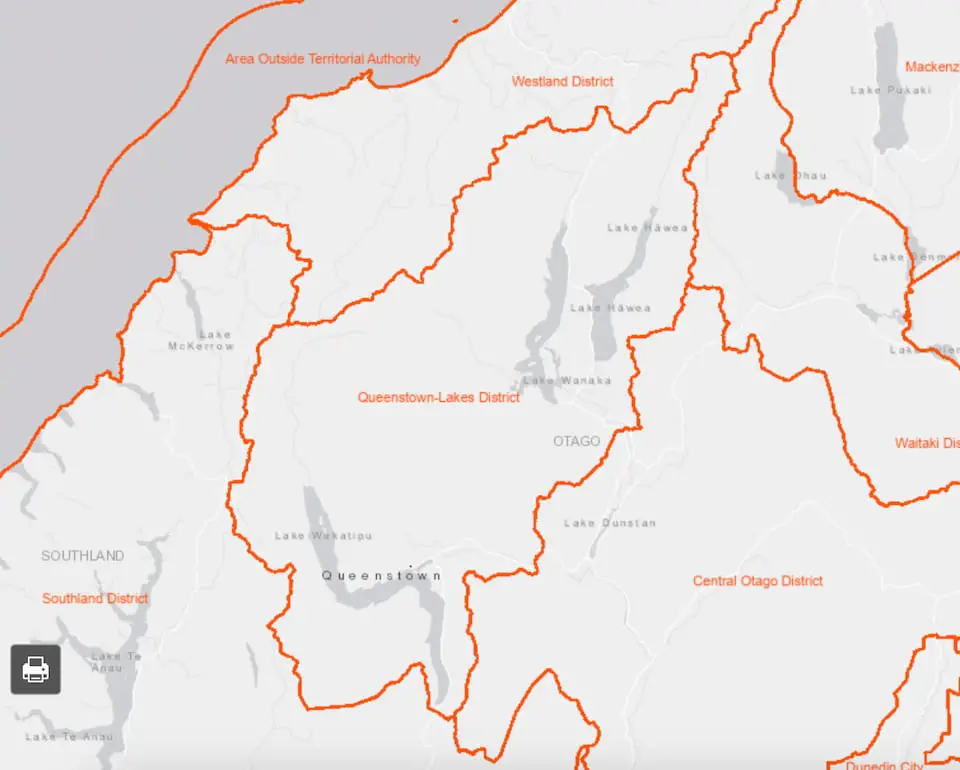
- Population: 39,153 (2018), 49,500 (2022) – Queenstown-Lakes District, 13,539 – Queenstown.
- Best suited for: Everyone who loves outdoor sports plus backpackers, work and holiday visa holders, retirees, investors, and high-income individuals.
- The average rent for a two-bedroom house: starts at NZ$650 per week.
Queenstown is situated in the Otago region, on Lake Wakatipu, between the Southern Alps. It’s also a part of the Queenstown Lakes District, which is the most luxurious and desired place to live in New Zealand.
Queenstown is a top-rated tourist destination in New Zealand, mainly due to the breathtaking nature and range of things to do.
The city is renowned for its outdoor adventures like skiing, hiking, and biking, but also bungee jumping and jet boating. In fact, Queenstown is one of the best places for skiing in the entire country. Even Aussies are frequent guests here for this very reason. Read the article about winter and winter sports in Queenstown.
The city hosts almost 2 million visitors each year, so you definitely will notice how touristy it is. It’s also a party town and a favorite place for young backpackers from around the world.
Pros of living in Queenstown
Let’s start with why Queenstown is such a fantastic city to live in New Zealand?!
1. Natural beauty
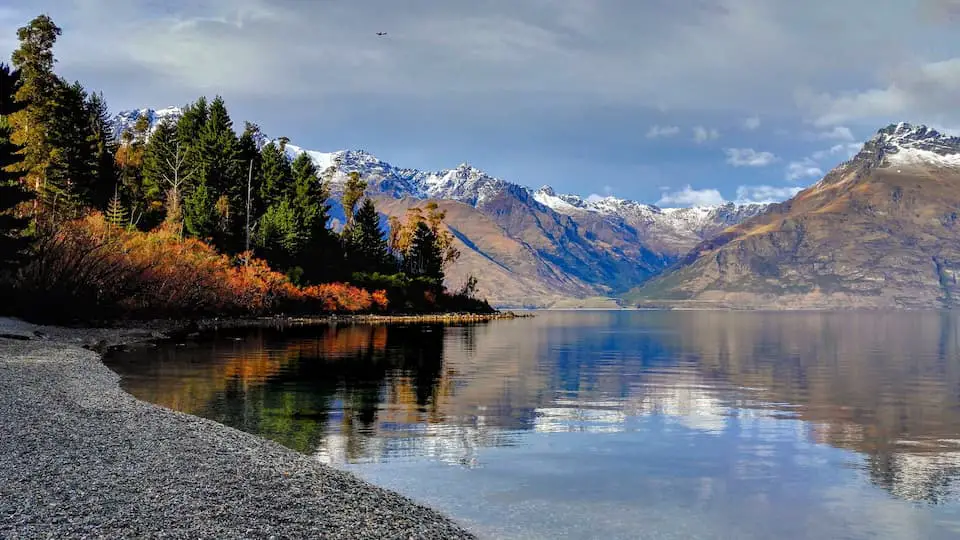
Well, should we even tell you how beautiful Queenstown is? You probably already know it, as most people relocate here exactly for this reason!
Queenstown and Queenstown Lakes District are some of the most stunning and picturesque places you will find in New Zealand.
It has stunning mountains, like the Remarkables, Cecil Peak, Walter Peak, Queenstown Hill, and Ben Lomond. Lakes also shape this area, hence the name Queenstown Lakes District. Whakatipu is the main and most known one.
Thanks to its magical scenery, many people decide to spend here their vacation days just to enjoy the stunning landscape and go on hikes to embrace nature.
2. Lifestyle
Queenstown is a major tourist city in New Zealand. It’s busy with tourists all year round, where in summer, people arrive to embrace hikes and swims, and in winter, it’s about skiing and snowboarding.
If outdoor sports and nature fit into your lifestyle, then there is no better place to be.
Besides activities in the fresh air, there are many options for shopping, eating, and drinking out. Queenstown always has something going on, and bars are lively. Generally, it’s a very energetic city despite its small size.
The CBD of Queenstown is small and compact, allowing you to walk anywhere. Yet, if you want to shop for groceries or go to the gym, you will need to drive or take a bus to the neighboring town of Frankton.
3. Weather
Queenstown enjoys a drier and colder climate, which is very comfortable all year round, with little to no snowfall in the winter (in the town, but the mountains get pretty showy). Weather is similar to Europe, you can expect warm, pleasant summers and slightly colder winters.
In the mountains, however, you will find plenty of snow to pursue all possible winter sports. It’s a very lively ski resort in the winter season. The temperature ranges between 15°C and 25°C in summer and -1°C and 8°C in the winter.
Queenstown is one of the few places in New Zealand where you will get to experience all four very distinctive seasons.
Here is the general overview of the climate in Queenstown across the whole year:
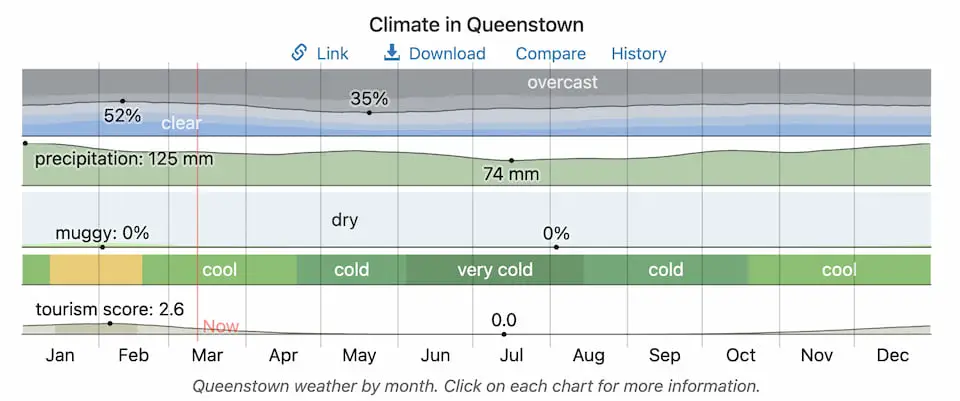
Here is an overview of average temperatures for each month:

Fortunately, there isn’t much rain in Queenstown, so it’s perfect if you prefer a drier climate. Read more about the weather in different seasons on this super helpful website.
4. Outdoors
Outdoors is the main reason why people move or travel to Queenstown, and if you decide to relocate here, you absolutely should do some outdoor activity; otherwise, it isn’t worth the money!
There is a long list of outdoor activities and sports you can do in the region, but look at least at the most common one – hiking or tramping, another top recreational activity among locals.
5. Plenty of things to do
Despite the small size of Queenstown, there are so many things to do! Most of them are related to sports and the outdoors, the list goes on and on.
However, you will also find heaps of entertainment options like cafes, restaurants, and places to relax with friends or family.
6. Adventure capital

It’s the true adventure capital of New Zealand and is known around the world for its winter and extreme sports.
If you are an outdoorsy person and love to spend time in the mountains, Queenstown is a place to be. It’s excellent for activities like skiing, snowboarding, mountain climbing, mountain biking, rock climbing, bungy jumping, paragliding, ziplining, skydiving, jet boating, and whitewater rafting.
Keep in mind that adventure activities can be costly. Local businesses are targeting wealthy tourists rather than locals. Yet, you still can experience many great things that QT has to offer. You just need to be a bit creative and go explore on your own.
For instance, some free activities are hiking, biking, or running. Pick one for yourself and enjoy!
7. Party town
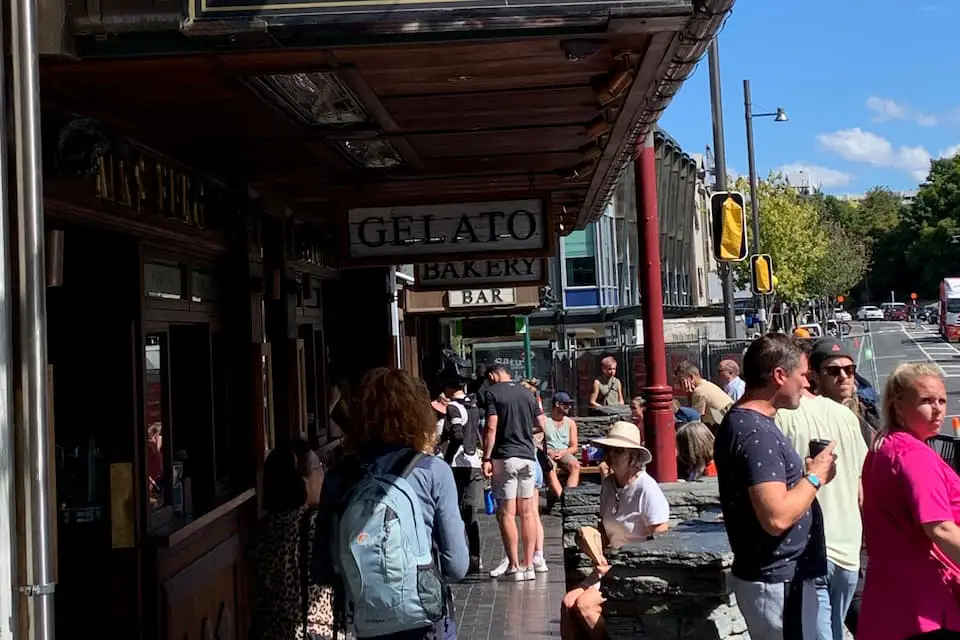
Queenstown is a little town, but it has a party scene of a large city. Every night, there is something going on; just check main bars and clubs like Atlas Bar, Cowboys, or Bar 1876.
Yet, for some people, this fact can be somewhat negative. If you don’t want to see drunk backpackers, simply choose a place to live outside of the town center.
8. Perfect for remote workers
If you have a remote job or an online business, you can truly enjoy all that Queenstown has to offer without relying on a local job market (which is pretty tiny).
As a remote worker, you can benefit from working from home, a stress-free environment, and, of course, the stunning landscape to watch out of your window.
9. Plenty of jobs in some industries
It’s very easy to get a job in Queenstown, yet it’s most likely to be a job in hospitality and tourism and usually a temporary offer. If you are looking for a position in these industries, there is no shortage of jobs, meaning you will get one in no time.
Many people in Queenstown come and go, so hostels, hotels, shops, and restaurants are always hiring.
Working in Queenstown for a season is a great way to experience the city, but don’t expect to save a lot of money. Most of your salary will go to the rent.
At the moment of writing, at the beginning of March 2023, there were 580 available in Queenstown, mainly in the hospitality industry. Still, other options are also available, e.g., positions in marketing.
Also, the construction industry is booming in Queenstown, and if you have a trade or experience in this area, you will also easily find a job and a better-paying one.
That said, the primary industries that drive the economy in Queenstown are:
- Accommodation and food services – 13,4%
- Construction – 12,8%
- Rental, hiring, and real estate services – 10,4%
- Professional, scientific and technical services – 9,2%
- Retail trade – 7%
- Arts and recreation services – 4,9%
On the graph below, you can also see the number of total companies in Queenstown by industry. That gives you an idea of how many potential employers you will have:
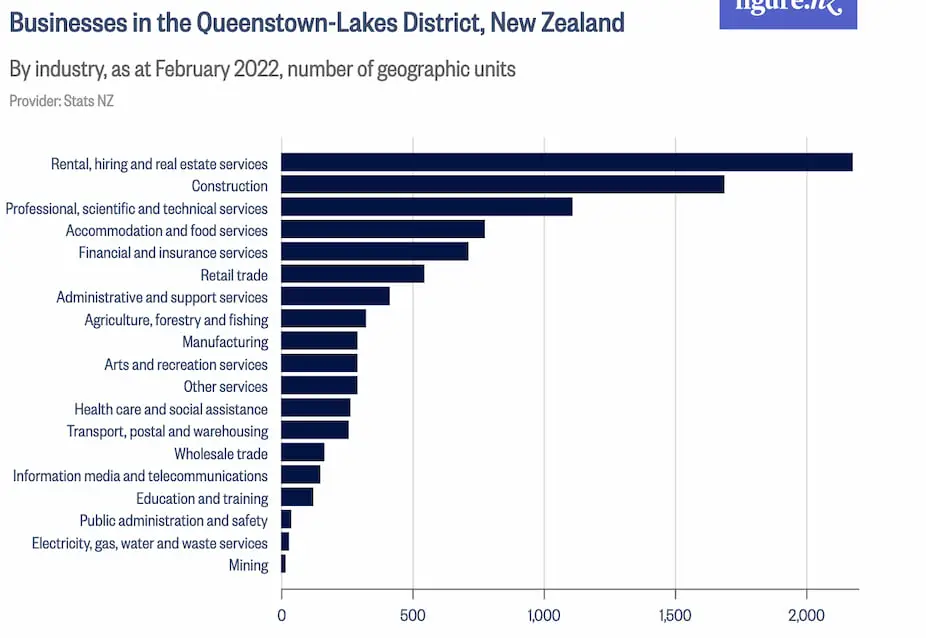
Therefore, if you don’t see your industry in the list above, your chances of getting a job might be pretty slim.
Cons of living in Queenstown
With all good on this planet comes something bad. Read on for the main negatives of living in Queenstown, and, please, don’t move here without considering them!
1. High cost of living
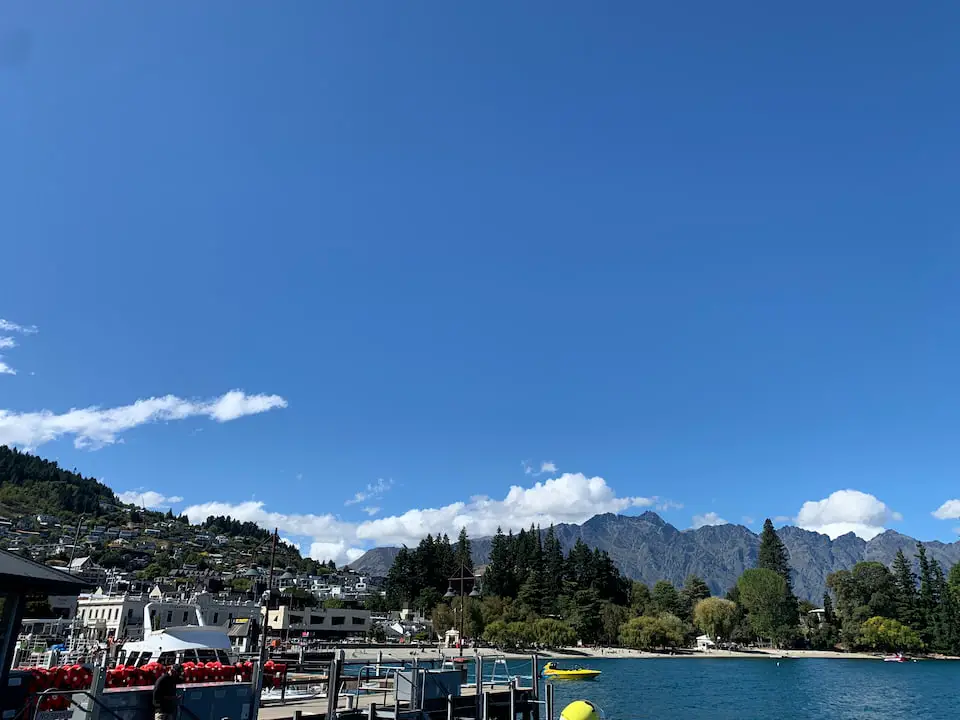
Despite its small size, Queenstown is the second most expensive place to live in New Zealand after Auckland.
In 2023, the average cost of living for a single individual is around NZ$4,000 for a single and double that for a family of four. Rent prices start at NZ$650 per week for a single-family home.
If you like to attend the gym, a membership goes for at least NZ$25 per week, which is at least NZ$100 per month.
Fuel is the most expensive in Queenstown and Auckland, coming to NZ$2,59 per liter for petrol 91, and diesel costs NZ$2,39 per liter (as of March 2023).
Also, don’t forget to get enough mobile data when traveling around because the top-up is expensive. An unlimited plan with Vodafone costs NZ$80 per month, and you might get away with paying NZ$43 per month for 10 GB of data.
Here is the summary of the cost of living in Queenstown:
| Cost of living for expat | NZ$4,087 / month |
| Cost of living for the family | NZ$8,044 / month |
| Cost of living for local | NZ$2,298 / month |
| Airbnb (median price) | NZ$4,633 / month |
| One-bedroom studio in the center | NZ$2,200 / month |
| Airbnb (median price) | NZ$152 / night |
| Hotel (median price) | NZ$200 / night |
| Dinner | NZ$35 |
| Breakfast | NZ$20 – $25 |
| Beer (0.5L) | NZ$11.00 |
| Coffee | NZ$6.00 |
Cost of food and eating out
Queenstown has several supermarkets to choose from, including New World, Countdown, and PAK’nSAVE. PAK’nSAVE is a discounter, so it’s the cheapest option. However, the shopping experience might not be that great.
Fruits and vegetables are very expensive even in season, I can’t imagine how much it costs in the winter.
Groceries are slightly more expensive in Queenstown than they are anywhere else. This is probably due to the isolated location and tourism.
Here are some typical food prices you will see:
| Item | Price |
|---|---|
| Milk | 2.78 NZ$ |
| Bread | 3 NZ$ |
| Rice | 3 NZ$ |
| Eggs (12) | 8 NZ$ |
| Local cheese (1kg) | 16 NZ$ |
| Chicken fillets (1kg) | 15.96 NZ$ |
| Beef round (1kg) | 21.75 NZ$ |
| Apples (1kg) | 4.41 NZ$ |
| Banana (1kg) | 3.29 NZ$ |
| Oranges (1kg) | 5.63 NZ$ |
| Tomato (1kg) | 10.74 NZ$ |
| Potato (1kg) | 3.44 NZ$ |
| Onion (1kg) | 2.46 NZ$ |
| Lettuce (1 head) | 5.25 NZ$ |
| Water (1.5 liter bottle) | 1.17 NZ$ |
| Bottle of Wine | 18.85 NZ$ |
| Domestic Beer (0.5 liter bottle) | 4.48 NZ$ |
Queenstown has plenty of places to eat and drink, from the least expensive takeaways to fine dining restaurants. Yet, even a takeaway won’t cost less than NZ$12 – NZ$18, even in the bakery.
An ice cream scoop at the famous Patagonia Chocolates is NZ$7, while in next door Wanaka, you pay NZ$5.
Here is an overview of prices:
- A breakfast/brunch: NZ$16 – NZ$25
- Lunch: NZ$25 – NZ$30
- Dinner with a drink: NZ$30 – NZ$40
- Coffee: NZ$5 – NZ$7
- Coctails: NZ$14 – NZ$18
- Beer: NZ$10 – NZ$13
That said, there are some good deals to be had in Queenstown. For example, many bars have happy hours at certain times during the day. You can get a drink for NZ$5 and a meal for NZ$15.
2. Expensive housing
If you are moving to Queenstown, you are probably looking at renting a place instead of buying. Be aware that Queenstown is one of the most expensive parts of New Zealand to buy or rent a home in.
Housing is also the biggest issue in Queenstown, as it’s very expensive and tough to find. Because Queenstown is so costly, many people live further away in towns such as Frankton, Arrowtown, and Lake Hayes, as the houses in these areas are slightly cheaper, and the sections are a little bigger.
That said, a typical two-bedroom house goes for at least NZ$650 per week. However, in reality, many homes are rented for NZ$800 – NZ$1,000 per week, which is unaffordable for the majority of people moving here.
A single-bedroom house or an apartment will cost less, from NZ$550 – NZ$600 per week. However, it’s rare to come across the smaller place.
Consequently, young and adventurous people usually rent a room in a house with others. Since many people in the area work for a minimum wage, they can afford only this.
There are some rooms for rent, but the competition is high due to the constant influx of backpackers. You can expect to pay for anything from NZ$180 to NZ$400 per week for a room. Bills are usually not included.
Cost for utilities ranges depending on usage, but generally, you can expect to pay about NZ$200 per month for a two-bedroom house. Internet is paid separately and is pretty expensive in New Zealand, ranging between NZ$60 to NZ$80 per month.
When looking for a place to stay, check out the Facebook group For rent in Queenstown, New Zealand, the largest group to find accommodations in the area.
Besides, you might consider living outside Queenstown town because it’s usually prohibitively expensive. Some other good areas close to Queenstown (Queenstown lakes) include:
- Arthur’s Point
- Goldfield Heights
- Jack’s Point
- Arrowtown
- Frankton
- Lower Shotover
- Fernhill
- The Town Centre
- Lake Hayes
House prices
In Queenstown, you will come across some of the most expensive properties in New Zealand. For instance, an average house in Queenstown, Otago, costs about NZ$1.7 million. Nonetheless, it attracts many investors as homes there are in high demand.
See below how house prices in Queenstown compare to overall New Zealand and more data about buying and owning a home.
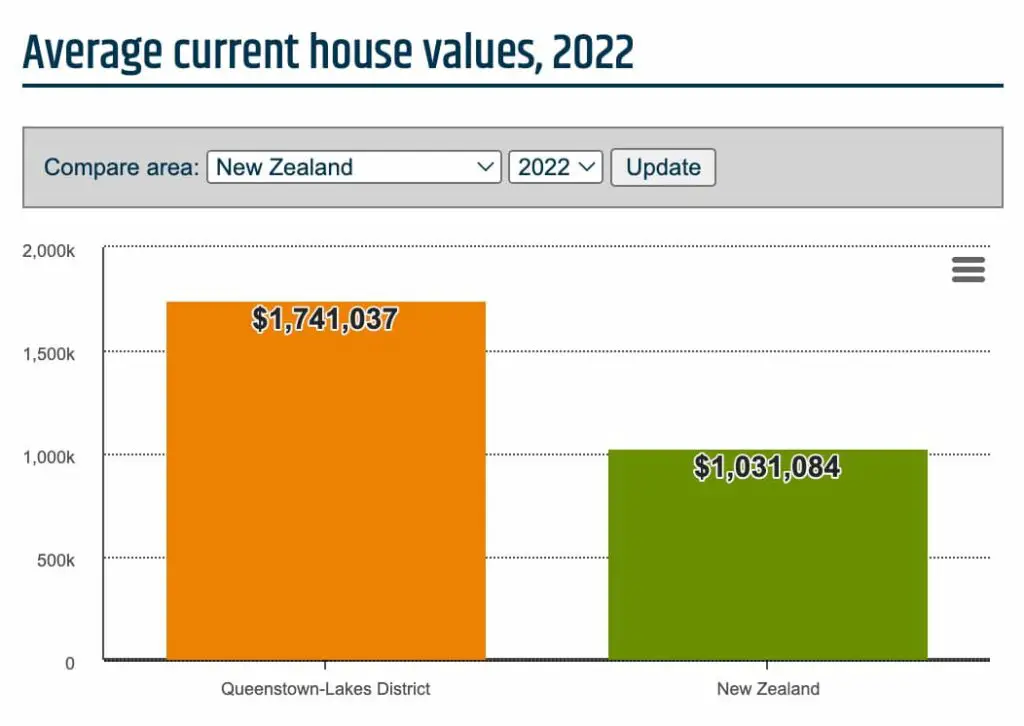
From official statistics, it’s clear that homes in the Queenstown Lakes District are unaffordable, and if you take a mortgage, more than 80% will go to mortgage.
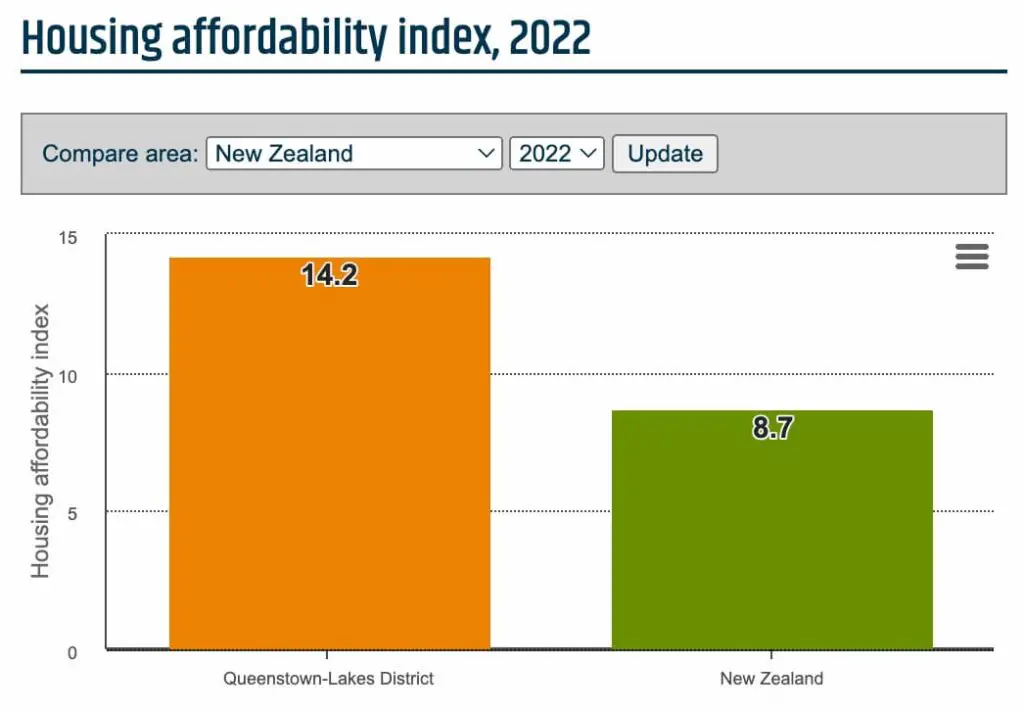
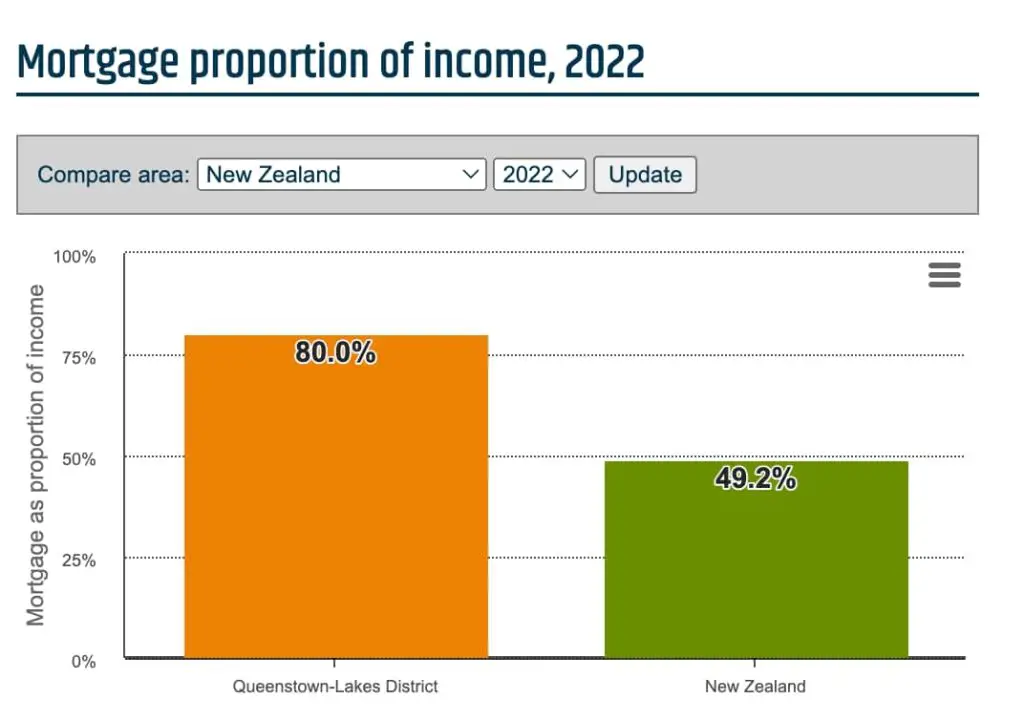
3. Housing shortage
In addition to high property prices, there is also a shortage of houses in the Queenstown area, especially in the peak season of winter (June to September) and summer (December to March).
During this time, many work and holiday visa holders arrive in the region to work in the hospitality industry.
This simply comes to supply and demand. Plus, many landlords use their homes as short-term accommodations for tourists rather than renting them out for the long term.
You will often see that several dozens of people apply for one room or an apartment or house. Hence, the competition is fierce.
4. Lack of careers and job opportunities
Since Queenstown is a small, touristy city, job opportunities are limited. As a result of this, most people work in hospitality and tourism.
You will also have good chances if your occupation lies in construction, as Queenstown town is just a nonstop building site.
It’s better to secure a job before moving, most backpackers do so. Finding a job in hotels, bars, or retail is pretty straightforward but difficult in other areas.
That said, Queenstown is a great place for remote workers, online entrepreneurs, or retirees with money since the job market is tough.
5. Low wages
Queenstown is a pretty unique place. There aren’t many areas of New Zealand where you will see such low salaries and high living costs.
For reference, in Queenstown, the average earnings in 2022 were NZ$60,198, while for all of New Zealand, it was NZ$69,585. Hence, people earn almost NZ$10k per annum less in Queenstown.
At the same time, the mean household income in 2022 was NZ$122,623 in Queenstown and NZ$117,934 across New Zealand.
While these are well above average numbers, the majority of people moving to Queenstown earn a minimum wage, which is NZ$22.70 (from April 2023). It translates only to NZ$848 weekly or NZ$3,392 monthly. After taxes, you will be left with NZ$2,873, not a lot, exactly to cover your rent.
You can see the average salaries for some professions in the table below:
| Job title | Range | Average |
|---|---|---|
| Carpenter | NZ$22 – NZ$40 | NZ$30 |
| Carpenter apprentice | NZ$18 – NZ$26 | NZ$23 |
| Duty manager | NZ$19 – NZ$25 | NZ$21 |
| Electrician | NZ$29 – NZ$37 | NZ$33 |
| Builder | NZ$23 – NZ$39 | NZ$30 |
| Operations manager | NZ$20 – NZ$48 | NZ$27 |
| Retail store manager | NZ$20 – NZ$26 | NZ$23 |
Also, have a look at the annual average salaries for some typical jobs in QT:
| Job | Pay range | Average salary |
|---|---|---|
| Quantity surveyor | NZ$53k – NZ$124k | NZ$71,216 |
| General / operations manager | NZ$62k – NZ$127k | NZ$75,497 |
| Civil engineer | NZ$59k – NZ$131k | NZ$85,000 |
| Accountant | NZ$46k – NZ$86k | NZ$60,678 |
| Project manager | NZ$74k – NZ$101k | NZ$90,000 |
This means the residents here are often largely underpaid and don’t earn high enough income to cover their basic needs, like renting a home. One shouldn’t move to Queenstown if they are looking for a good salary.
6. Location
The location of Queenstown could be considered a pro or a con, depending on how you look at it. Queenstown is a pretty remote place situated between the Alps. There aren’t any large or medium-sized cities nearby.
You can see on a map the distance to the largest city in the Otago region, Dunedin, Invercargill in Southland, and Christchurch in Canterbury.
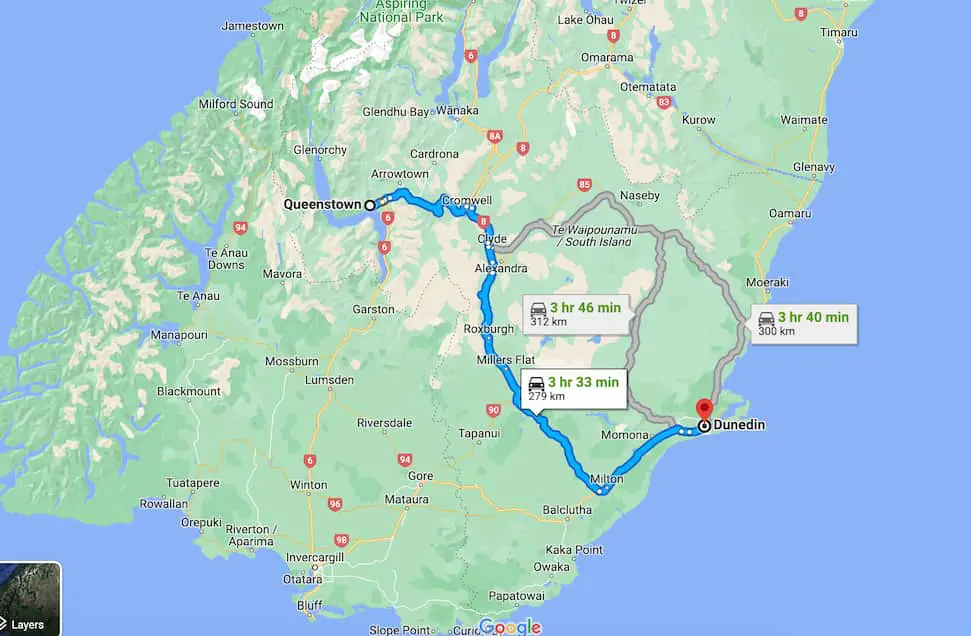
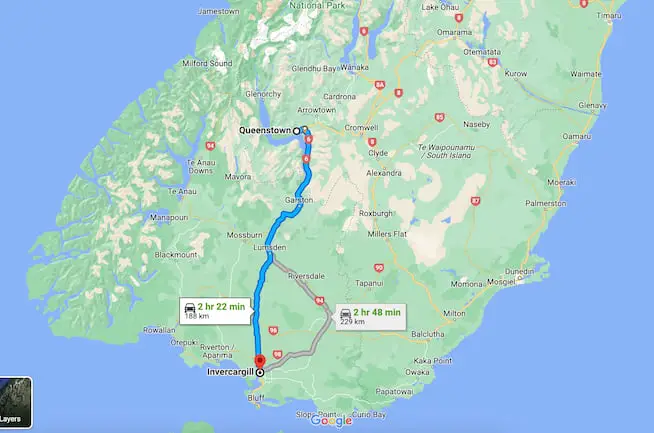
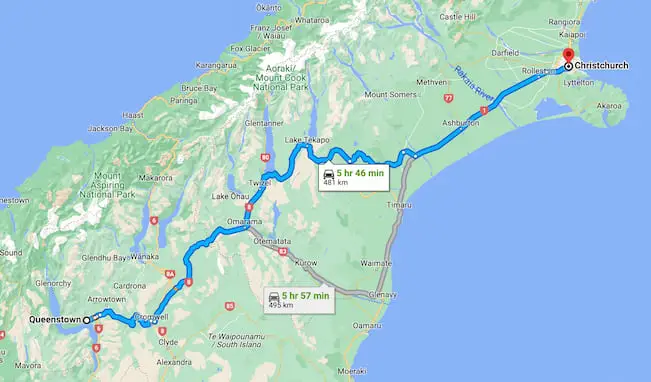
Consequently, if you need or want to go to one of the main cities on the South Island, you would need to either fly or drive for a significant amount of time.
On the map below, you can also see the proximity of Queenstown to the main sites and cities:
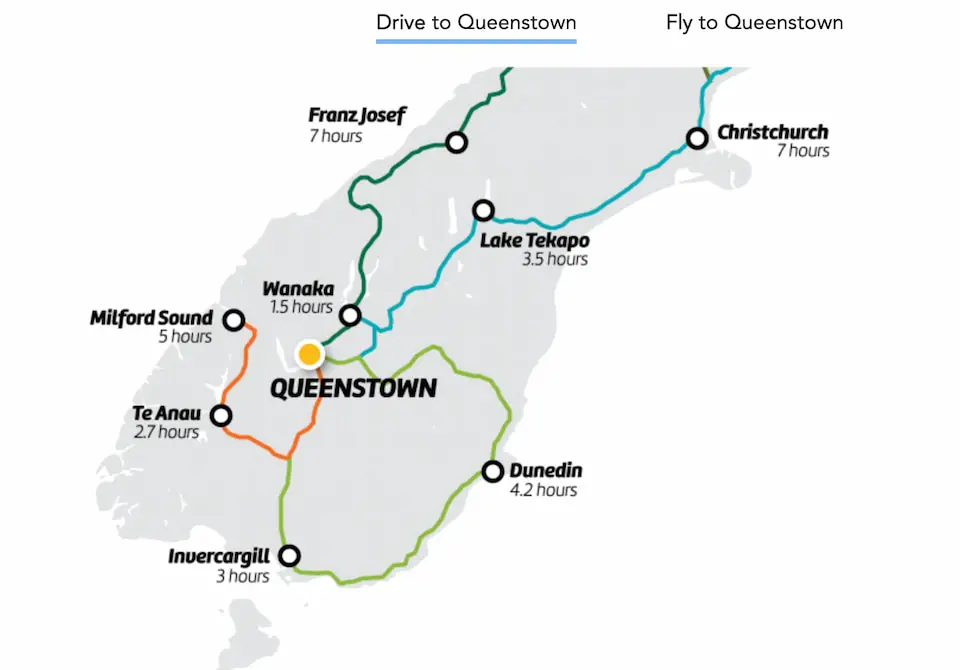
7. Public transportation
Public transportation is pretty much non-existent. You want to get a car unless living in the town center is your goal. However, keep in mind that parking can be an issue in Queenstown, as it’s tough to find a place in the city.
Queenstown still has some transport options for those without a vehicle. There is a public bus that passes through several pass stations.
However, the schedule is pretty infrequent, and tickets are expensive. You pay NZ$4 for an adult ticket, which you can get a discount for by purchasing a Bee card.
8. Friends and relationships
Many people report that locals tend not to invest time in making friends or building relationships with newcomers because they would move away anyway (in many cases).
Unfortunately, thousands of people move to Queenstown, but not many of them stay there permanently as it’s hard to maintain a good standard of living with low wages and a high cost of living.

